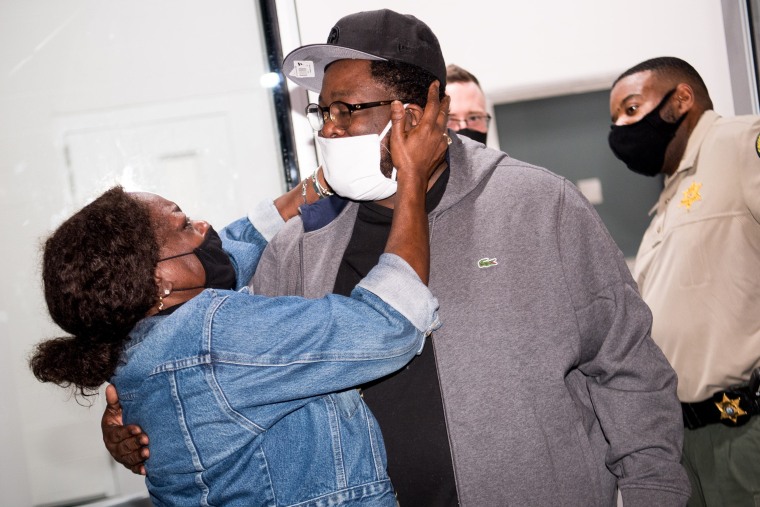A Nashville man walked free this week after serving nearly 15 years of a lifetime sentence for a 1998 murder for which he was wrongfully convicted.
Joseph Webster, 41, was released from Davidson County jail Tuesday night and reunited with his mother, sons and other family members after the state approved a petition to overturn his murder conviction.
“Oh God is good, Joseph! You home baby. Oh Lord have mercy,” Webster’s mother said while embracing her son, video from NBC News affiliate WSMV in Nashville showed.
Webster’s exoneration is the first in Nashville since the county's conviction review unit was established in 2016, said Webster’s lawyer, Daniel Horwitz.
“Mr. Webster was the first person to apply for review from the Davidson County District Attorney’s Conviction Review Unit,” Horwitz said Friday. “That unit — and its processes and personnel — evolved in large part because of issues and problems identified during this case.”
Webster stood trial in 2006 for first-degree murder in the 1998 slaying of Leroy Owens, according to court documents. Within hours of starting deliberations, the jury found Webster guilty, in part because of witness testimony that identified him as the killer, and was sentenced to life in prison.
But a decade later, the new unit designed to review cases that may have ended in wrongful convictions found critical flaws in Webster’s trial. At the same time, Horwitz and his team started their own investigation.
Four years later, after new evidence and witness testimony was found, the district attorney’s office announced it “no longer has confidence in the conviction of Mr. Webster” and recommended to a judge that “Mr. Webster’s conviction be vacated and the charges against him dismissed.”
“Given the avalanche of new exonerating evidence that we were able to develop through a new investigation, I was confident that we would reach this point eventually,” Horwitz said. “I didn’t know when or how, and there were certainly many low points along the way, but ultimately I did expect that we’d get here, no matter how long it took.”
In 1998, Owens was in a parking lot in downtown Nashville when two men in a white station wagon chased him down and bludgeoned him to death with a cinderblock, according to court documents. Witnesses said they believed the motive was a drug debt and identified two Black men as the assailants.
One was described as having a medium build and weighing roughly 160 pounds. A witness picked Webster from a photo lineup as that suspect. But Webster was roughly 300 pounds and had visibly gold teeth, a descriptor no witness recalled either man having.
When Webster enlisted the help of Horwitz in 2016, the witness had since recounted her testimony.
“At that point, the only witness who had ever identified him as one of the perpetrators had already recanted her testimony under oath multiple times and had obvious credibility problems,” Horwitz said.
He also had the weapon used in Owen's murder tested for Webster’s DNA, and none was found.
“It was very clear to me that the evidence against him was extremely weak, that the investigation into this murder had been sloppy and incomplete at best, and that this was a very serious innocence claim," Horwitz said.
Evidence presented in the wrongful conviction case included the finding that a relative of Webster's, Kenny Neal, had bragged about committing the murder, according to court documents.
“I’m so happy, I really don’t know what to say,” Webster told WSMV the night of his release. “The hard part is over with and now I’ve just got to deal with this part, and that’s the best part of it.”
One of Webster’s sons told the station it was the first time he had seen his father outside of prison.
“Every time I’ve seen him, he’s been behind bars,” Joquan Webster said.
“He loves his family and he's missed them every single day he was incarcerated,” Horwitz said about his newly freed client. “He went straight to his mother’s house, had his first home-cooked meal — meatloaf, cornbread, turnip greens, macaroni and cheese — in almost two decades, and started making up for lost time with his mom and his kids.”
He said Webster is working on getting his voting rights restored, taking a driver’s test again and planning to start his own trucking business.
